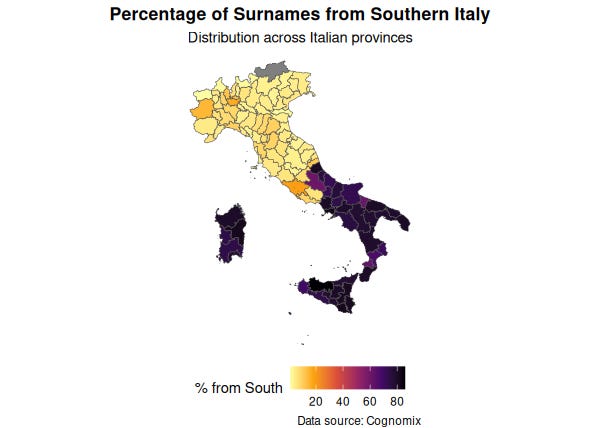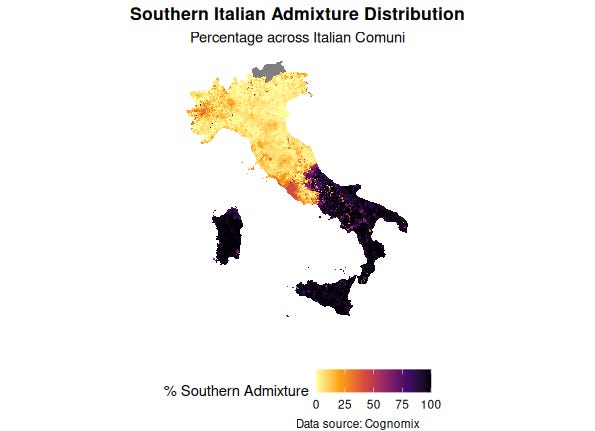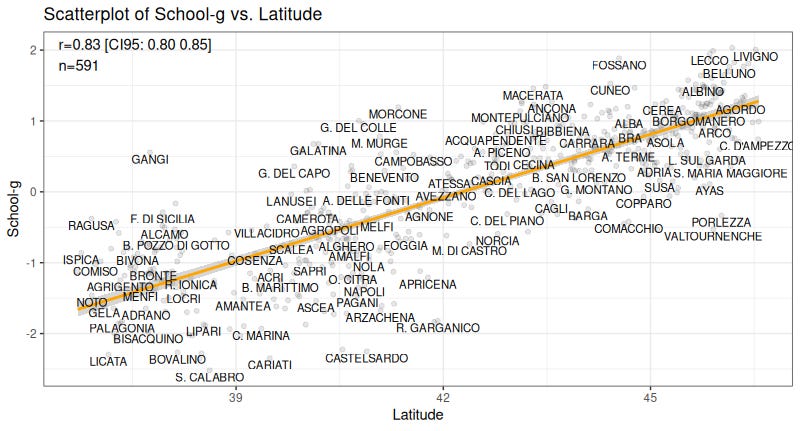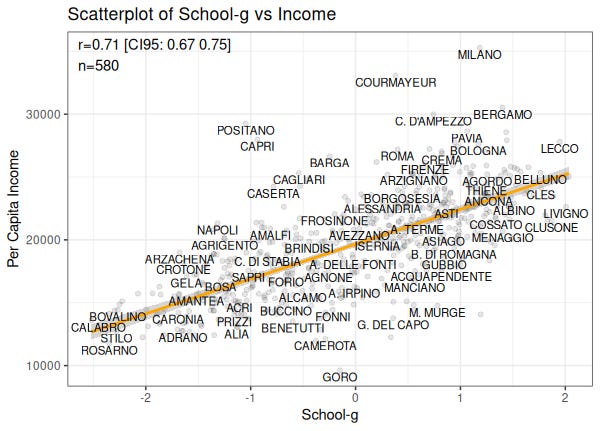How Italy’s Surname History Predicts Today’s Education Gaps: Part 1
A deep dive into regional disparities—with an interactive map of genetic admixture
Italy isn’t just a country—it’s a living laboratory for understanding how deep historical forces shape modern life. With its stark north-south divide, centuries of fragmented rule, and waves of internal migration, Italy offers the perfect case study for how cultural and genetic legacies intertwine to influence education, wealth, and even exceptional talent.
Why Italy? A Natural Experiment in History’s Long Shadow
Few places on Earth reveal the interplay of genes, culture and geography as vividly as Italy. For millennia, waves of migration - from the ancient Greeks in Magna Graecia, to Germanic tribes like the Lombards and Goths to North African Saracens - crashed against the peninsula's mountainous spine, creating a mosaic of distinct regional identities. The Alpine north developed separately from the Mediterranean south, while city-states like Venice and Florence forged their own destinies. These weren't just political differences - they etched themselves into surnames, dialects, and even the cognitive strengths of their populations.
Then came unification in 1861, followed by mass migrations (like the post-WWII southern exodus to northern factories such as Fiat). But despite becoming one nation, the past never really left. Today, standardized test scores still trace the old borders of kingdoms and republics. Math Olympiad winners cluster where medieval universities once thrived. And surnames—frozen in time since the Council of Trent—reveal how ancestral origins predict success better than modern tax brackets alone.
The Hidden Clues in Italian Surnames
With over 330,000 unique surnames, Italy’s naming patterns are a goldmine for studying historical population movements. Since the Council of Trent (1545-1563) mandated surname registration, these names have acted as genetic and cultural markers, preserving migration routes from medieval times to the post-WWII economic boom.
Using TF-IDF (a text-analysis method adapted for surnames), I mapped how much each Italian province’s surname pool reflects historical migration from other regions—particularly the south. The results? A striking north-south gradient in both ancestry and modern standardized test scores.
Key Findings
✔ Southern surname prevalence predicts lower educational performance—even after accounting for current wealth (r = -0.81, p < 0.001).
✔ Latitude matters more than regional labels—ancestral geographic origins (weighted by surname history) explain 78-81% of variance in outcomes.
✔ Math Olympiad winners follow the same pattern—when surnames are traced back to ancestral regions, talent clusters align with historical migration, not just modern GDP.
✔ Economic factors don’t fully explain the gap—while wealth mediates some disparities, the surname effect persists across models.
Explore the Data Yourself
I've visualized southern Italian genetic admixture across two geographic levels:
Province-level map showing regional patterns of southern ancestry
Municipality (comune)-level map revealing hyperlocal variations
The North-South Gradient: Latitude as a Proxy for Ancestry
The surname analysis reveals Italy’s educational disparities are ultimately geographic at their core. A striking r = 0.81 correlation emerges between latitude and student performance—stronger than even the income-achievement link (r = 0.71):
Two layers of meaning:
Genetic-environmental interplay
Replicates Cavalli-Sforza’s (1994) clinal variation in allele frequencies
Surname-weighted latitude outperforms raw geographic position (ΔR² = +0.12)
Modern policy paradox
Wealth explains only 30% of the latitude effect (mediation analysis)
The Wealth-Mind Gradient: How Cognitive Skills Shape Prosperity
A robust literature demonstrates that cognitive abilities - whether measured through educational attainment or IQ - powerfully predict individual (Schmidt & Hunter, 2004; Strenze, 2007) and national income (Hanushek & Woessmann, 2008; Lynn & Vanhanen, 2002). My data reveals this fundamental relationship plays out across Italian municipalities with striking clarity:
The 0.71 correlation I observe aligns remarkably with:
• Cross-country studies showing IQ explains ~60% of wealth differences
• Within-nation analyses of the education-earnings link
• The "cognitive capitalism" thesis that modern economies increasingly reward cognitive skills
Yet Italy's story adds nuance - while the general pattern holds, our surname analysis reveals how historical migration patterns modify this relationship. The same cognitive skill premium exists everywhere, but baseline levels vary systematically with ancestral geography.
Yet Italy’s pattern reveals critical nuances:
Systematic baseline variation: While the cognitive skill premium exists everywhere, ancestral geography (captured by surnames) shifts intercepts
Tourist-town outliers: Positano, Capri, and Courmayeur show large positive residuals—likely because:
✓ Tourism economies inflate income beyond cognitive capital predictions
✓ Seasonal/service jobs attract migrant labor not reflected in surname ancestry
✓ Local wealth captures exogenous factors (scenic value, infrastructure)
This highlights Italy’s dual reality: cognitive economics operates universally, but historical migration and geographic luck modulate its expression.
This scatterplot thus captures both a universal truth about cognitive economics and Italy's particular historical imprint on that relationship.
Why This Matters
Italy’s regional inequalities aren’t just about policy or recent history—they’re shaped by centuries of movement and mixing.
What do you think? Are these gaps fixable, or is history too deeply rooted? Let’s discuss in the comments.
Want to see Italy’s educational divide through a genetic lens? In my next post, I’ll reveal:
🔍 The hidden patterns: How surname-inferred admixture predicts performance—from standardized tests to Math Olympiad medals
🏆 Elite talent clusters: Why certain provinces produce disproportionate numbers of top math competitors
📊 Shocking correlations: The 0.81 link between ancestral latitude and test scores (stronger than GDP’s influence!)
Want to dive deeper? I've also built an interactive version that lets you explore how these historical migration patterns correlate with modern educational outcomes.
The data shows your surname might reveal more than your family history—it could predict your probability of academic success. Subscribe now so you don’t miss Part 2!
The interactive maps below reveals how surname origins correlate with modern outcomes—subscribe to unlock full access:






